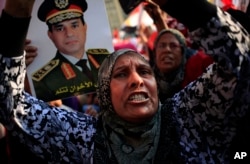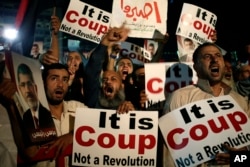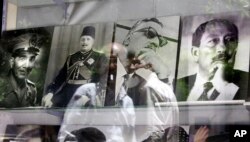CAIRO —
Egyptian General Abdel Fattah el-Sissi has emerged as the key leader in the interim military government. The general rose from obscurity, was chosen by then-President Mohamed Morsi to lead the armed forces last year, and went on to unseat him.
To millions of Egyptians, the savior of the nation, the man who ousted President Mohamed Morsi, checked the threat of unbridled Islamism and steered Egypt back to its true path.
Massive banners of the general dominate rallies, as supporters chant his name. Outside a tent in Tahrir square, woodcarver Ali el-Gazzar turned el-Sissi's image into a sculpture.
“Thanks be to God to General el-Sissi,” he said, adding there would have been a civil war if God hadn't wanted him to exterminate terrorism.
Since el-Sissi has come to dominate the political landscape, “terrorism" has become a code word for Morsi and his supporters, hunkered down in encampments in Cairo and around the country.
So it's not surprising the the ex-president's Islamist base takes a different view of the general.
The same el-Sissi images can be seen in those encampments, only with a noose superimposed around his neck.
Former air force officer Ibrahim Suilam said there's a “cult of Sissi”. He finds the supporters' blind adoration appalling.
"The photos are propaganda and they make me feel disgusted," Suilam said adding that he's reminded that there is a person “who has stolen my will, stolen my freedom and killed my brothers.”
El-Sissi was a virtual unknown when Morsi picked him as defense minister last year. At 58, el-Sissi was a relatively fresh face compared to the old guard military council that had continued to exert its influence even after Egypt's first freely-elected president came to power.
Allegiances
But el-Sissi's allegiances were initially unclear. He said nothing when Morsi assumed extraordinary powers to push through a new constitution - one that protected the powerful interests of the military.
And when el-Sissi said in April that “the hand that harms any Egyptian must be cut,” both pro- and anti-Morsi forces felt he was their man.
Then, on July 3, after days of mass protests against Morsi, the president was out, and General el-Sissi was seen as a future president.
Details of the military's concerns about the Islamist president have since emerged. They lend some credence to accusations of behind the scenes meetings with anti-Morsi protesters who were fed up with increasing Islamism and a collapsing economy.
The military, which has vast business interests - some estimates are as high as a quarter of Egypt's output - saw it's domain in jeopardy as well.
History repeats itself
And in Egypt, it is an easy leap to imagine a military forays into politics.
From General Gamal Abdel Nasser, who led a coup against the monarchy, to Anwar Sadat and Hosni Mubarak, military men have ruled Egypt.
Even when frustration with Mubarak led to his ouster - people welcomed The Supreme Military Council as their interim ruler.
Morsi was an aberration - a member of an outsider group propelled by the ballot box to highest office, though he too resorted to tactics outside the lines of democracy.
It's a distressing dynamic for some, which keeps ordinary Egyptians removed from the workings of government. Human rights researcher Priyanka Motaparthy.
“Going forward, input on these vital documents that are going to shape the face of Egyptian public life - the constitution, the right to demonstrate, the right to free media - all these need to be drafted and revised incorporating civil society's voice,” said Priyanka Motaparthy of Human Rights Watch.
As the adulation of el-Sissi continues in some quarters, it remains unknown whether he will give meaningful power to the people, or whether it will have to be reclaimed again.
To millions of Egyptians, the savior of the nation, the man who ousted President Mohamed Morsi, checked the threat of unbridled Islamism and steered Egypt back to its true path.
Massive banners of the general dominate rallies, as supporters chant his name. Outside a tent in Tahrir square, woodcarver Ali el-Gazzar turned el-Sissi's image into a sculpture.
“Thanks be to God to General el-Sissi,” he said, adding there would have been a civil war if God hadn't wanted him to exterminate terrorism.
Since el-Sissi has come to dominate the political landscape, “terrorism" has become a code word for Morsi and his supporters, hunkered down in encampments in Cairo and around the country.
So it's not surprising the the ex-president's Islamist base takes a different view of the general.
The same el-Sissi images can be seen in those encampments, only with a noose superimposed around his neck.
Former air force officer Ibrahim Suilam said there's a “cult of Sissi”. He finds the supporters' blind adoration appalling.
"The photos are propaganda and they make me feel disgusted," Suilam said adding that he's reminded that there is a person “who has stolen my will, stolen my freedom and killed my brothers.”
El-Sissi was a virtual unknown when Morsi picked him as defense minister last year. At 58, el-Sissi was a relatively fresh face compared to the old guard military council that had continued to exert its influence even after Egypt's first freely-elected president came to power.
Allegiances
But el-Sissi's allegiances were initially unclear. He said nothing when Morsi assumed extraordinary powers to push through a new constitution - one that protected the powerful interests of the military.
And when el-Sissi said in April that “the hand that harms any Egyptian must be cut,” both pro- and anti-Morsi forces felt he was their man.
Then, on July 3, after days of mass protests against Morsi, the president was out, and General el-Sissi was seen as a future president.
Details of the military's concerns about the Islamist president have since emerged. They lend some credence to accusations of behind the scenes meetings with anti-Morsi protesters who were fed up with increasing Islamism and a collapsing economy.
The military, which has vast business interests - some estimates are as high as a quarter of Egypt's output - saw it's domain in jeopardy as well.
History repeats itself
And in Egypt, it is an easy leap to imagine a military forays into politics.
From General Gamal Abdel Nasser, who led a coup against the monarchy, to Anwar Sadat and Hosni Mubarak, military men have ruled Egypt.
Even when frustration with Mubarak led to his ouster - people welcomed The Supreme Military Council as their interim ruler.
Morsi was an aberration - a member of an outsider group propelled by the ballot box to highest office, though he too resorted to tactics outside the lines of democracy.
It's a distressing dynamic for some, which keeps ordinary Egyptians removed from the workings of government. Human rights researcher Priyanka Motaparthy.
“Going forward, input on these vital documents that are going to shape the face of Egyptian public life - the constitution, the right to demonstrate, the right to free media - all these need to be drafted and revised incorporating civil society's voice,” said Priyanka Motaparthy of Human Rights Watch.
As the adulation of el-Sissi continues in some quarters, it remains unknown whether he will give meaningful power to the people, or whether it will have to be reclaimed again.









